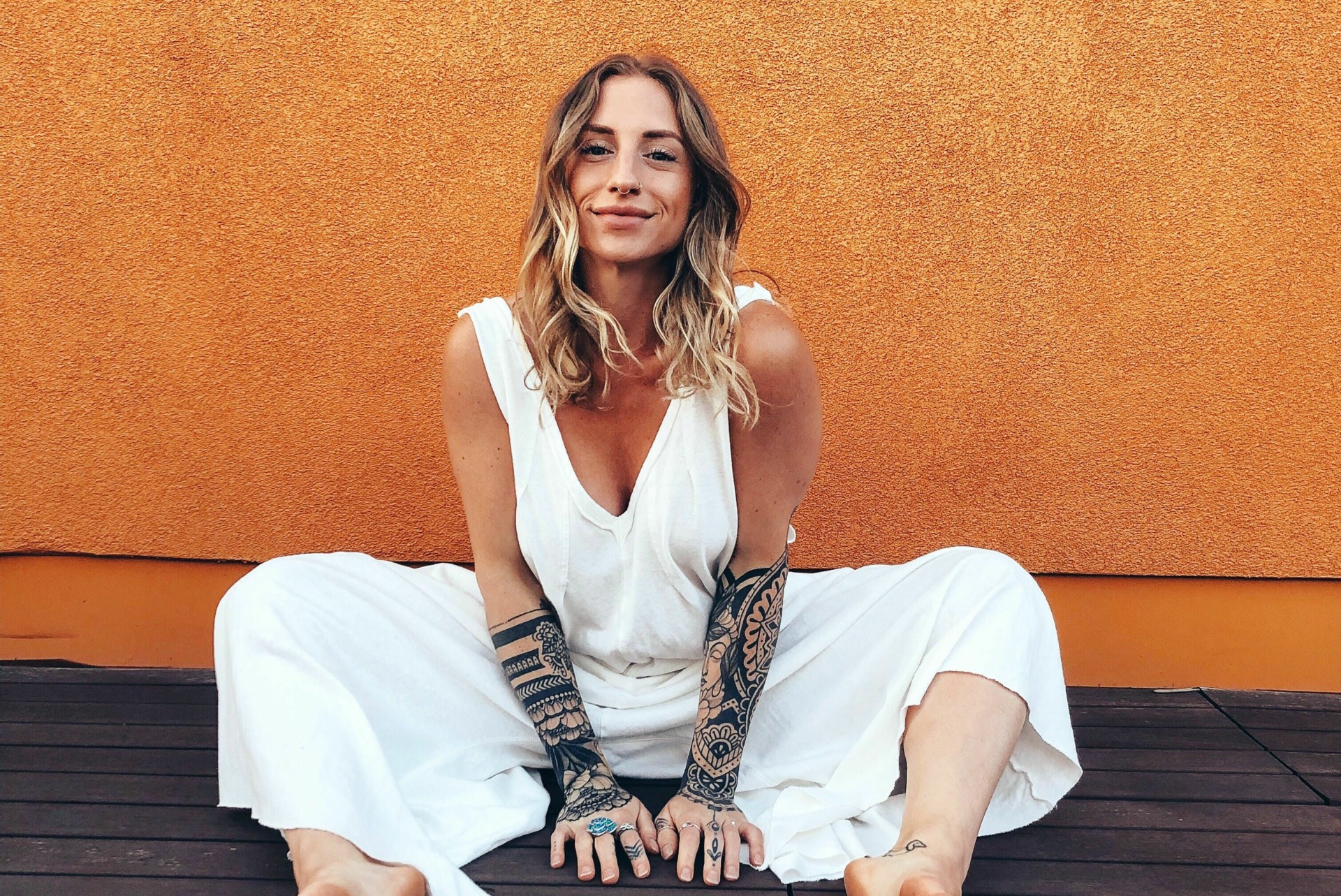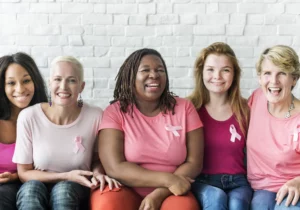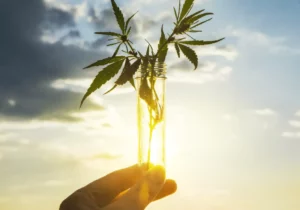Julianne Vaccaro is a holistic health and life coach, somatic sexologist and podcaster. For over seven years, she’s been helping women reach their goals by having them look within themselves. Her program dubbed Goddess Reclamation is all about helping women realize their feminine power through self-reflection, mindfulness, healthy eating practices and pleasure.
“Each male, each female has a struggle with body image and how we’re supposed to be in the world. I think that females can struggle with it a little bit more,” she says.
“There’s more of an expectation of the way that we should look and the way that we should eat and the way that we should be that makes [overcoming] the negative self-talk even harder.”
FOLLOW US ON FACEBOOK & INSTAGRAM
By combining her background in integrative nutrition, somatic sexology and personal life experiences, Julianne helps her clients become more comfortable in their own skin. She uses lots of tools, including cannabidiol (CBD), to help women be the best versions of themselves—inside and out.
Let’s start out with the basics: Why did you get into holistic health coaching?
I started my journey about seven years ago—almost eight now—and started out for a lot of negative reasons. I was really wanting to just fix myself and fix my body, because I felt very broken around my body image and in my self-confidence and just my whole relationship to myself.
I started out being a holistic health coach. I went to a program for that, and I went super extreme and was raw vegan for about three years. I was eating super clean, super healthy, was really active. And I ended up getting adrenal fatigue super severely.
So that led me down a path to healing the adrenal fatigue and recognizing how important it is to really listen to a diet that works for you and following your own specific protocol. I introduced meat back into my diet and that really showed me how you can eat as healthy as you want, but if there are other pieces of your life that aren’t in alignment, you can come down with something like adrenal fatigue or have all these other symptoms.
At the time, I was in a relationship that wasn’t for me and although everything looked seemingly healthy and happy and perfect, there were all these other things going on in the inside that led me down that path.
And then I got into the physical side of things and started teaching yoga and started teaching boxing. I taught for about five or six years and with personal training throughout that whole time and was really focusing more so on the physical in addition to the health.
Then I discovered bodybuilding and took a hard turn into the aesthetics and really destroyed my body from the inside out. I lost a lot of the holistic practices that I had and totally messed up my gut, my hormones, the relationship I had with food. I developed even more of a disordered eating pattern and habit—bingeing, emotional eating.
And when I finally decided to stop competing, I had to heal my body from the inside out. I had to heal my amenorrhea—I had lost my period for almost a year. I balanced up my gut and really worked on the relationship that I had with food, myself and my body.
That led me down a path of spiritual and personal development. It led me into somatics and sexological work. And that was kind of like the glue that holds it all together, I’d say.
Let’s jump back to the holistic health coaching program that you went through. How did it impact your coaching style and philosophy?
I went to the Institute for Integrative Nutrition. I’m not sure how much the program’s changed, [since I was in school], but back then it was very much based off of dietary theories. Really looking at every area of who you are and taking that holistic approach that I very much practice now. Looking at the mindset, looking at your emotional well-being and looking at your relationships and your passions and how they relate to your overall health and well-being.
In addition to that, [the school] encouraged a lot of “bio individuality”—so, following an eating routine that really works for you specifically. It was almost like we were given all of these different dietary theories and all of this education, and then it was like, OK, “now go figure it out for yourself.”
I definitely practice not teaching all the dietary theories, but instead really giving an educational system to my clients so they’re able to strengthen their own intuition and get in touch with themselves and their bodies.
What types of people normally undergo your coaching program?
A lot of the women who come through the program are wanting to live out their purpose. I find that I attract a lot of leaders and women who are wanting to be at the forefront, but recognize that the way they view themselves and their relationship with food are really holding them back.
Why did you decide to get into health coaching as opposed to another health-oriented career?
My mom at the time when I enrolled in health coaching school had just been diagnosed with celiac disease, and she had been misdiagnosed for about two years. She was having really severe gut issues, and they couldn’t figure out why. And all of the celiac testing and all of the food sensitivity tests were coming back negative. She wasn’t getting an answer; she wasn’t getting any clarity.
I think at the time that was kind of helping me make the decision that health was where I wanted to go. But I was also enrolled in a dietetics program. I was going to go to the University of Tampa to become a registered dietitian and strongly decided against it, because I really wanted to be able to coach.
And I really wanted to take that holistic approach and look at all of these other areas. Mindset, personal development and spirituality were really big passions of mine—even at that time, and I wanted [my work] to embody all of that.
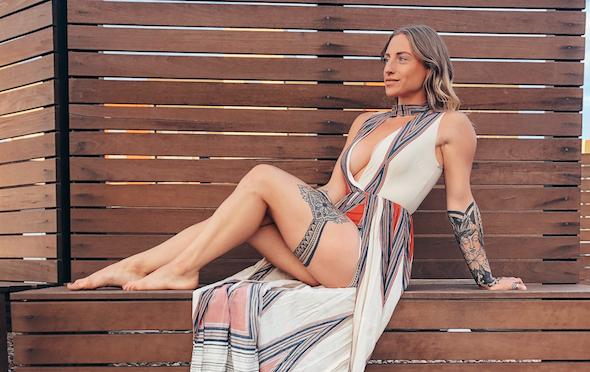
Your coaching style seems to center a lot around food. Can you talk about why that is?
I think that [food] ties into a lot of why I went the route that I did, because I always knew that it was never about the food. And I always recognized that all of my struggles, while food was the controlling variable for me, that wasn’t the driving force.
A lot of the women come [into my program] with a really negative mindset. They hate their relationship with their body and food. But it’s never about the food.
My approach with food and anything else that’s happening with the students that go through my programs is really getting to the root cause of it and giving them back their power.
Food may be the catalyst and may be what you’re going after, but there are usually some other things that are going on underneath the surface. If it’s extreme cravings, there’s multiple levels to it.
How is your gut health? What are your hormones like? If your gut health seems to really be suffering, then your cravings are going to be really strong. And if your hormones are out of balance, well then you might feel hungrier. So, it’s all of these moving pieces.
Why do you think food is such a main sticking point for so many of your clients?
I think that it’s the most easily controlled—or perceived to be controlled. And so then we try to control food, but then food ends up controlling us. And then we end up in this awful cycle of restriction and bingeing and over-eating, and then it creates this negative self-talk.
And I don’t think it’s only pertinent to women. Each male, each female has a struggle with body image and how we’re supposed to be in the world. I think that females can struggle with it a little bit more. There’s more of an expectation of the way that we should look and the way that we should eat and the way that we should be that makes the negative self-talk even harder.
In addition to that, I believe that the sexological component is really important. Another common theme [in my work] is the disconnect to our bodies and a lack of safety in our bodies. It’s from whatever stories and traumas that we’ve had growing up, but also societal pressures. It creates this disconnect in our bodies, this lack of safety. And so, we’re turning to food, because we’re also extremely lacking pleasure and sensuality.
Let’s talk about your work in somatic sexology. Can you explain what that is and why you got into it?
I’m in a program currently to be a practitioner of somatic sexological work. And I came across the work from my own journey, because I felt like I had done so much personal and spiritual development, but I still didn’t feel like I was where I could be.
I felt like my body was holding on to a lot of trauma and wounds and stories. It was like I was all the way over here, yet my body was kind of in the background holding on and being anchored down to the past.
And so that led me into a somatic healing journey for myself to really release a lot of my own trauma and abuse. I also was involved in some abusive relationships that were traumatic on myself and my experience.
My journey was always very tied to the physical, my physical body. And so, it made sense that I needed bodywork to also clear that out.
Somatic sexological work is a combination of somatics, so moving emotion and energy through the body. But then incorporating the sexological piece where you’re bringing in pleasure and really healing the wounds that you’ve just opened through the somatic process with pleasure and connecting spirituality to that and bringing that into your body.
And what does somatic sexology look like in practice?
I would say that it’s very particular to the individual who’s interested in the program, because
everyone’s body responds differently. A typical session is three hours. You’re on a table, there are two practitioners working with you the whole time.
Generally speaking, it’s going to be a male and a female, because they’re representing the masculine and the feminine. There’ll be times throughout the session where you need to use both energies, and both energies are super important to complete that memory, whether it be the male practitioner coming in and holding space or acting as your father or a past partner. But then also the feminine coming in and doing that same thing or nurturing you and holding that space.
[Sessions involve] really pressing into the body, looking for those trigger points where there’s memory and energy stored. Using breath, sound and movement, you’re able to move through those memories and move through those traumas.
And those traumas look super different for everybody. It might look like screaming; it might look like shaking, like wailing, crying—whatever you need to really release and to clear that out.
What have you personally noticed after going through somatic sexology sessions?
It changed the way that I view and operate in every area of my life. I feel that I was led to this work, and this is where I’m supposed to be. It ignited my own deeper awakening and purpose. It really just shifted every piece of me.
It dissolved all of the noise in my head, the blocks that really held me back from being fully me. I feel extremely self-expressed and authentic in all of myself.
Do you see yourself incorporating what you’ve learned into your current health coaching practice?
I feel that it’s already a big part of the program that I have now. Again, the pleasure component is so important even when it comes to food and these struggles that we have in our body as women, and so I find it hard to separate the two.
I have a couple of different programs that I run now, and I will be doing the somatic sexological work in person. I also teach a lot of my clients in my current program too, to go through the process on their own and learn how to somatically release for themselves as things come up and how to really use their body.
’Cause that’s the power of the feminine.
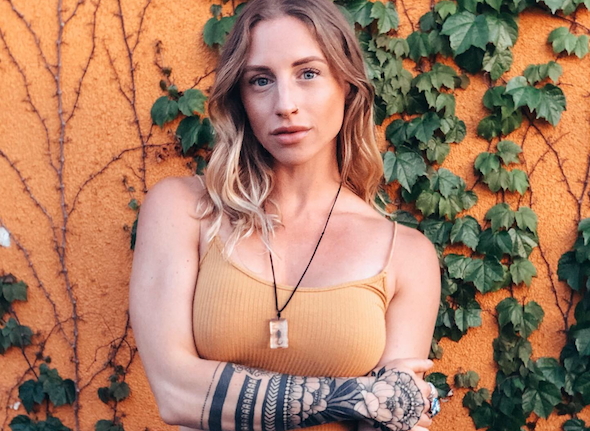
One of the programs that you offer is called Goddess Reclamation. Can you walk me through that program? What can a client expect going in?
Goddess Reclamation is an extreme mind, body, soul approach. Because to make those big transformational shifts, you need to look at every level of who you are: mental, spiritual, emotional, physical, social—all of you matters. And all of you makes up how you show up into the world every single day.
We start out with phase one, which is called Foundations. And within Foundations, we’re getting really clear on what limiting beliefs are present: old stories, subconscious programming that’s really keeping you in the cycle of where you’re at, whether it be negative self-talk or feeling like you’re not enough. And we dissolve those stories to really allow you to step into your authenticity, find your voice and move towards your absolute potential.
You’re also learning how to start to understand how your body works, which leads into phase two, which is called Body Blueprint. Just like we did in phase one, which was shining a light on all of the old stuff to dissolve it, to create the new, we do the same thing on a physical level.
And that’s all through gut health education. So, you’re learning what foods work for you, what foods don’t, what supplements might be beneficial for you, what supplements are not.
And it’s so important to have that education and awareness, because what worked for you a couple of years ago isn’t going to work now, and what works now isn’t going to work in a few years. The key is to open up communication with your body so that all you need is your body to help guide you and always bring you back into that alignment and that balance.
Phase three is called Holistic Healing, where we’re focusing on stress management. Stress is a really big piece that plays into the program, because so much of what we struggle with is a result of stress, and we don’t even realize it. You learn how to support your body in the best way possible on every single level, whether it be food, medicinal mushrooms, adaptogens, daily detox practices, soul food practices, how to stay and be in alignment as life throws you curve balls.
Phase four is called Intuitive Integration, where you become the master of intuitive eating for yourself. You’re also learning to balance the internal masculine, feminine energies within and learning about seasonal eating, organic foods, organic vs. conventional, what’s really most important for you.
And then also more holistic supplementation, super foods, vitamins, things like that. And then, also disordered eating patterns, triggers and things of that nature.
And then the last and final phase is called Creations, where you’re really connecting the mind and body and incorporating that sensuality, sexuality component. So, learning how to tap into your feminine powers, connect to your yoni, use your yoni to manifest and step into the life that you desire and dream of.
Throughout your coaching you advise your clients on a lot things—from coping strategies to food and supplements, including CBD. How have you seen people change once they started to add CBD to their daily regimen?
It’s helped them with insomnia, with their sleep. It’s helped them with inflammation in their joints. The top benefit I see is with anxiety and depression. A lot of my clients who come into the program perhaps are on antidepressants or antianxiety medications, and by the time they’re done with the program, they’re off it. A lot of them perhaps are transitioning off [those meds] using CBD or they’ve started CBD when they’re on their medication and then transitioning off of it and are no longer needing it.
RELATED: WHY TAKING CBD DAILY CAN HELP REDUCE YOUR ANXIETY
And how do you incorporate CBD into your own life?
I really like to take it when I’m getting my period as well to help with things like that and just regulating. So I personally don’t use any kind of over-the-counter medication. I don’t use any kind of painkillers or anything like that.
And so CBD is definitely my go-to if I’m ever having a headache or feeling just a little bit fatigued or I’m wanting to relax or something like that. I’ll use different combinations for different things and experiment with it that way.
As someone who’s been in the wellness space for a long time, what do you make of the popularity of CBD products?
I think it’s really powerful, and I feel that it’s important. Having [CBD] be more mainstream, I feel has brought awareness to a lot of more alternative natural remedies and cures for a lot of the ailments that are present in so many people’s lives.
CBD has just been this powerful product that’s opened the eyes of so many in the public, and I feel that so many other alternative medicines are now being able to become more mainstream.
Want to try CBD, but don’t know where to start? Shop our selection of high-quality, lab-tested CBD products and have them shipped to your door. And if you have questions about CBD, ask them and our community will answer.



